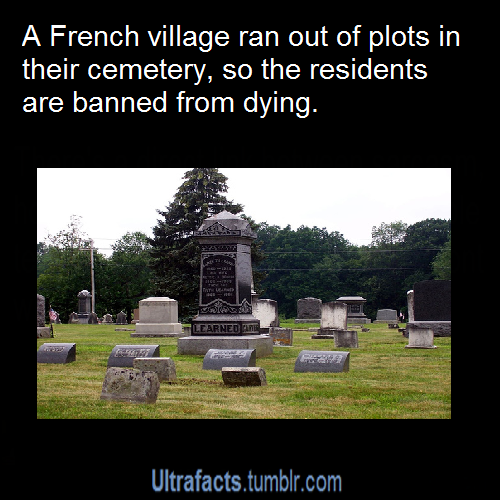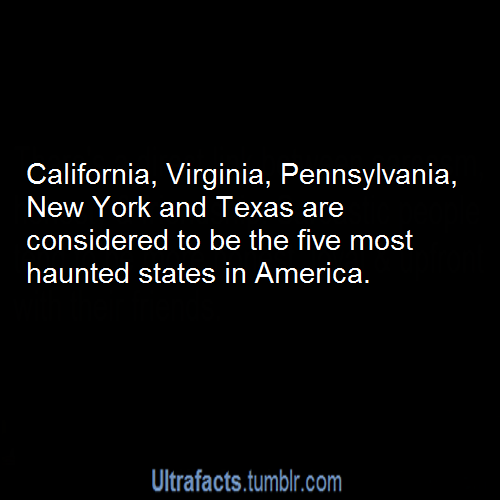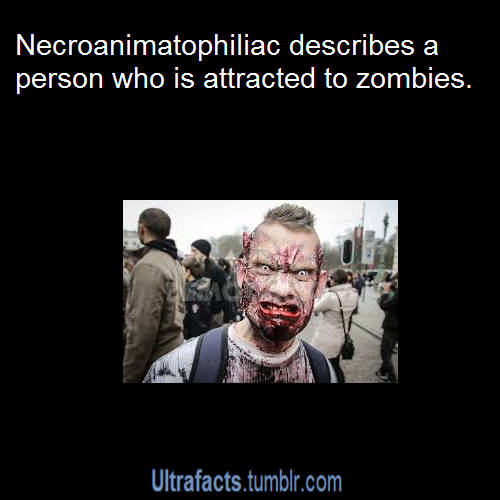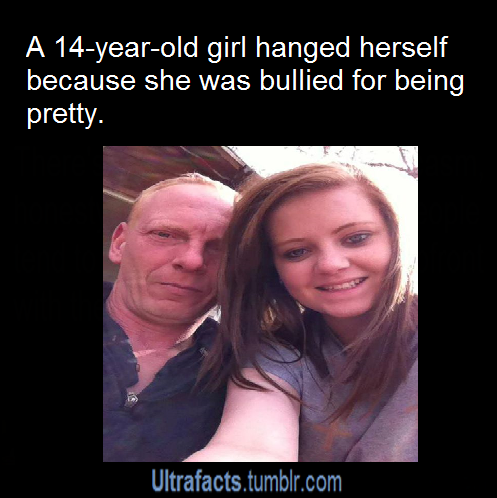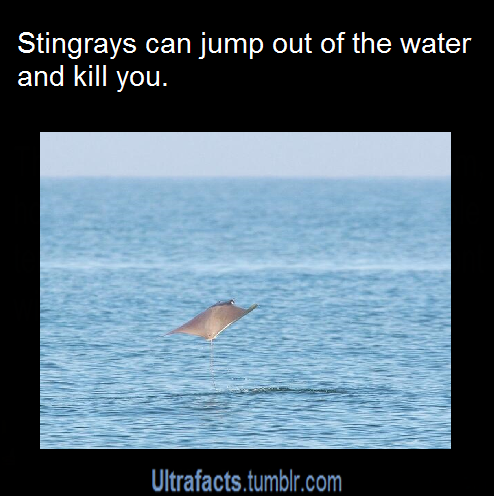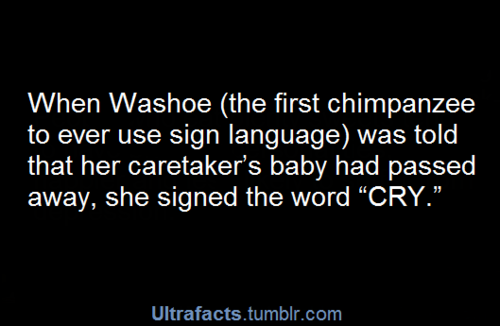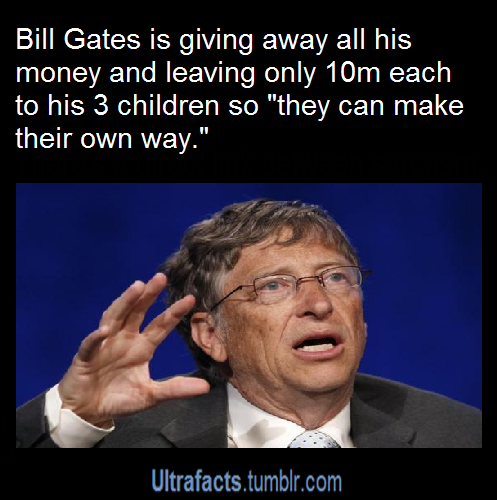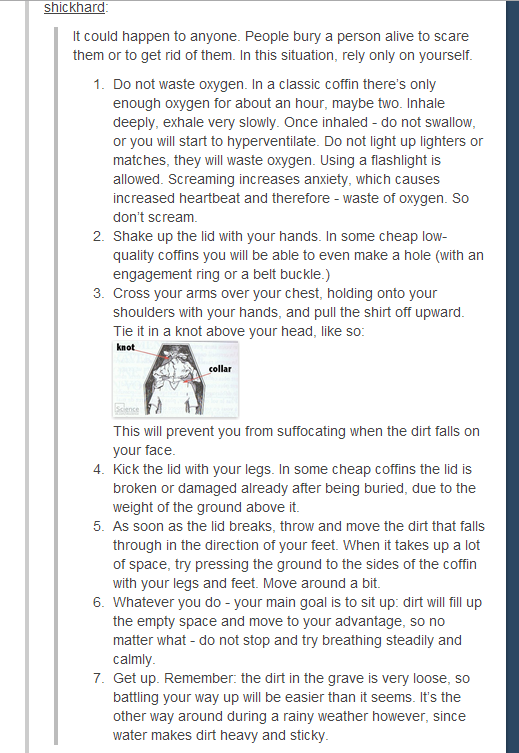Archive for year 2014
Death (and life) Unite Us All: A Video of a Father Being United with His Presumed Dead Son
When we embrace death, we embrace that part of humanity that we all share. We all share in connection, we all share in mortality and we all share in grief. Death, in separating us from loved ones, binds together those that remain in community and love.
It binds together the world in sorrow. Despite our religious, ideological views; despite our political borders and national heritage; despite the color of our skin, our sexual identity; despite the fact that we our different in so many ways, in our language, in our financial status, all of us will die. And all of us will experience the death of those we love.
If there’s a starting point in which we can find ways to tolerate and embrace one another in our differences, that starting point just might be death.
So, this video displays that. You’re probably not Syrian. You’re probably not Muslim. But you, like the father in this video, you love. And, like this father, if you thought your son had died from bombing only to find that he is indeed alive, you too would display everything you are in the fullness of your humanity.
12 of the Worst Things that Have Been Said at a Funeral
These stories were compiled by Reddit users. If you’re not familiar with Reddit, it’s kind of like Facebook except its users are generally anonymous and you can pretty much post anything you want. And you can comment on a thread even if you’re not friends with the original poster.
Also, if you’re sensitive to curse words and sexual innuendos, you may not want to read this post.
1.
2.

3. 4.
4.  5.
5.  6.
6.  7.
7. 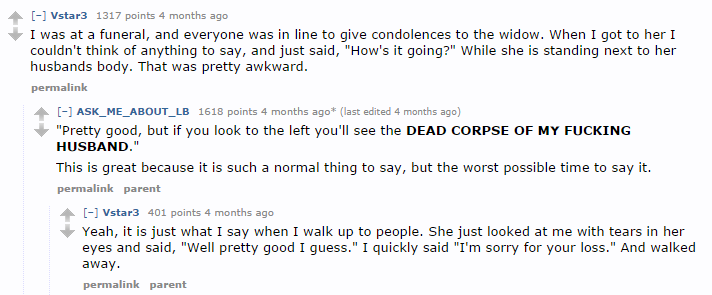 8.
8.  9.
9.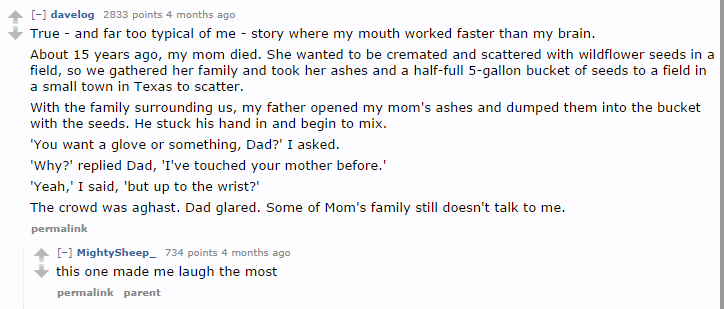 10.
10. 11.
11.  12.
12. 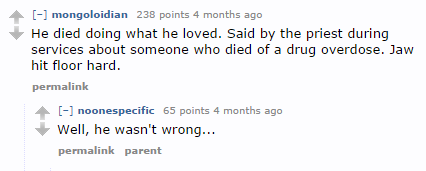
FIVE MYTHS ABOUT FUNERAL DIRECTORS
Today’s guest post is written by Pastor Dieter Reda:
Over the last 34 years of pastoral ministry I have conducted hundreds of funerals. That means I have worked with scores of funeral professionals. My ride to the cemetery is usually in the lead car, which normally is driven by the director who is in charge of a particular funeral. Sometimes it is a short ride, but there have been some longer trips also to distant cemeteries or to burials in a rural cemetery way out in the boonies. The conversations have ranged from the polite professional, to swapping stories, to the occasional theological conversation. In any case, when you spend time in close confinement with someone on a repeated basis, you get to know something about their personality and what makes them tick. And then there were two years of hiatus from ministry; time that I needed to heal some personal wounds. In that time I worked first at cemetery sales, and then spent a year in a corporate funeral home. That presented even more opportunity to spend time with funeral directors up close.
The majority of the men and women I worked with are capable and compassionate professionals, who believe strongly in what they do, and sincerely try to help the families they serve. For some however it is just a job, and a very small minority should probably be in a different line of work. But that is true of all professions, including the ministry. Some of the people I worked with, I would trust to look after my family, and in fact one of them did. A very few I would not trust with the burial of my dog. Several have remained my friends to this day.
Many directors struggle with the myths and stereotypical generalizations about their work and their role. . Here are some of the more common myths and my response based on being up close and personal with a number of these professionals.
- Funeral Directors are only in the business for the money. That is partially true for almost anyone who is gainfully employed. Everyone would like fair compensation and many if not most of us think that should be as much as possible. Some of the funeral directors that I was close to revealed their income level to me and frankly I was appalled how little they are paid. I would suggest that it takes a special kind of person with a deep commitment to what they do, to work the long hours that funeral professionals do, which often includes holy days and public holidays on which the general work force is paid not to work. Like doctors, nurses, police, fire fighters, ministers and others, a funeral director often has to work when everybody else is having fun. Some of the others are paid double time for those efforts, but not the funeral director. When a death happens on Christmas Day, we expect someone to be available when we call the funeral home. If you want to be in something “just for the money”, the funeral business is not the place to be, unless you happen to own a funeral home. Nowadays many of them are owned by huge corporations, and yes they are very profitable.
- Funeral Directors are opportunists who prey on other peoples’ vulnerability. The assumption is that funeral homes take advantage of the fact that you are emotionally distraught as you come to make final arrangements and that therefore they will manipulate you into spending as much money as possible. While there are unscrupulous people in every profession, the truth that I have observed is that most funeral directors prefer that the principal mourner not be alone when it comes to financial decisions such as what casket to purchase. Most encourage that other members of the family, or perhaps even close friends take part, in order to avoid making emotional and unwise decisions. I have known more than one director who has persuaded someone to consider a more affordable option. That is why they also advocate making pre-arrangements at a time when one can carefully consider what is affordable.
- Funeral Directors are aggressive sales people. My experience has shown me that actually very few of them are skilled sales people. Most of them are “order takers” who try and find what it is that the customer wants, and then make that happen. I have seen the “used car salesman” type of funeral director only in the movies. In real life, a mortician couldn’t stay in business if he or she had a reputation about such antics.
- Funeral Directors are insensitive Fakes. I actually met one, but only one such professional. It seems that no matter where you saw him, he had weepy eyes that actually could produce tears on demand, and he always spoke in that soft stained glass whisper. We don’t expect funeral professionals to pretend to be mourners. I have always appreciated the ones that are respectful in their demeanor, even when the funeral involves rituals that are contrary to a director’s beliefs. I don’t expect a director to sing the hymns, recite the creed or the prayers, but I would appreciate it if he did not whisper and joke with a colleague during such moments, and yes I have seen that too! When a family is a gravesite, the worst sight for them is to see the funeral staff standing behind the cars laughing and joking during the service, only to put on the soft whisper when they hold open the door to the limousine. That is fake, but according to my observation that is the exception, rather than the rule. Most of those that I have observed are respectfully professional, and others are genuinely compassionate.
- Funeral Directors are Experts about Everything on Death and Dying. To be honest, some of the younger newly licenced directors do come across that way. I had to remind one young colleague that he often served people who were much more educated than he, and know more about psychology, grief, to name just a few things. While more and more funeral directors now have university degrees, here in Ontario the educational requirements are minimal. A High School diploma will get you admitted into the “Funeral Services” program at one of the colleges in Toronto. This involves 1 year (2 semesters) of classes and embalming labs, followed by a 1 year apprenticeship in a licenced funeral home, after which time the provincial licence exam is written. The licence entitles you to embalm, and to sell and make at-need funeral arrangements. It does not however make you an authority on grief counselling, financial and estate planning, medical issues, and many other things that some funeral directors like to pontificate about. Neither does it make you a theologian, although I was surprised by how many former ministers ended up in the death care industry.
I have come to the conclusion that it takes a very special person to pursue this calling. Someone with a unique set of skills to deal with both the living and the dead. My advice: get to know one, preferably before you need to.
*****
Dieter Reda has been an ordained Minister for the past 34 years and served various churches in central and western Canada. Since 2003 he is senior pastor at Mission Baptist Church in Hamilton, Ontario (Canada). His blog of pastoral musings on various issues is at www.dieterreda.com and you can follow him on Twitter @Dieterreda.






